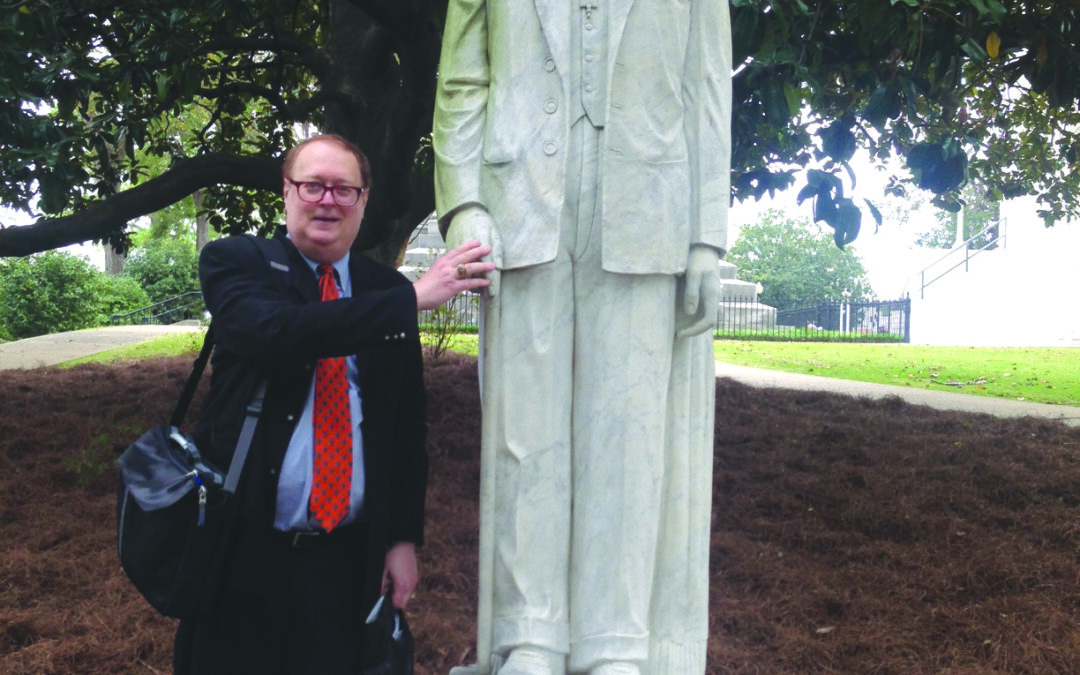Albert Patterson: A Man for All Seasons
BY JAMES PATTERSON
OPINION —
Seventy years ago, Phenix City lawyer and Democratic candidate for Attorney General Albert Patterson was assassinated. On Friday, June 18, 1954, Patterson was in his car near his office when he was fatally shot. Patterson worked to rid Phenix City of organized crime.
The day after Patterson’s assassination, the Associated Press headline read: “Assassin Shoots ‘Crime Fighter.’” Beneath a black-and-white photo of Patterson was the caption: “Slain in gangster style.”
The London (U.K.) Evening Standard wrongly reported that Patterson, a former Alabama state senator, was to have been appointed State Attorney General in January. While he was heavily favored to defeat this GOP opponent, a general election had to be held.
Patterson knew the mob wanted him defeated. “I have only a 100- to-one chance of ever being sworn in,” the courageous Patterson reportedly said less than 24 hours before his assassination. The British newspaper reported that Patterson died in “Phoenix City, Alabama.”
Great Britain’s Liverpool Echo, in a 6-paragraph news story, carried the headline: “Gangster Revenge.” It gruesomely described Patterson’s assassination: “An unknown assailant fired two bullets into his mouth.”
The Montgomery Advertiser, in a June 20, 1954, editorial, said: “The immediate reaction of average Alabamians was that Patterson was slain because he was the next Attorney General of Alabama.” The paper said that assassination was “something we think of as happening in some Balkan principality, or Latin dictatorship, not in a free American commonwealth.”
Upon learning of Patterson’s assassination, Phenix City Chamber of Commerce President Alton V. Foster announced his resignation. “I told my wife as soon as I heard it. This has reached the point where I personally cannot endure it any longer. I am through.” Foster had served the Chamber for 8 years.
Albert Patterson, who received a Purple Heart in World War I, gave the ultimate sacrifice for Alabamians. He campaigned tirelessly to end mob control of Phenix City. It took time and Pattersons’s assassination, but government was returned to the people of Phenix City.
I grew up in Alabama. I learned about Patterson’s courage from educators, ministers, and adults who had firsthand knowledge about mob control of Phenix City. In the 1950s, my father was stationed at Ft. Benning, now Ft. More. Patterson’s courage is remembered with his statue on the capitol grounds in Montgomery.
The 1955 film “The Phenix City Story” was a low-budget black-and-white production that gained a cult following. John McIntire and Richard Kiley were cast as Albert and John Patterson, respectively. Edward Andrews was perfectly cast as a villain.
“Torrid! Taut! True!’ appeared in a Los Angeles Times print ad for the film. “America’s wickedest city!” said another popular attention-getting print ad. The film was advertised for “Adults Only.”
On September 3, 1955, New York Daily News reviewed the film. “’The Phenix City Story’ is an amazing tale about the smashing of a vice syndicate by a few indignant citizens who cleaned up a Southern town that had become known throughout the land as Sin City, the wickedest town in the USA,” the critic wrote in the spirit of the sensational advertisements for the film.
An Alabama reporter mentioned John McIntire’s uncanny resemblance to Albert Patterson. A Birmingham News reporter said: “Even without makeup, McIntyre looks almost exactly like the slain crime fighter.”
Richard Kiley enjoyed his work on the film. In a 1966 interview, Kiley talked about being largely overlooked by Hollywood for major film roles. “I hated myself in every movie I’ve played in … [except] ‘The Phenix City Story’,” he said.
In 2019, “The Phenix City Story” was selected by the Library of Congress for preservation in the National Film Registry. The Library of Congress determined that the film about “Sin City U.S.A.” on the banks of the Chattahoochee River was “culturally, historically, and aesthetically significant.”
During a recent trip to Montgomery, I stopped at the State Capitol to pay respects to Albert Patterson, whose statue stands near the Attorney General’s office. I encourage others to visit Albert and recall his courage.
Robert Wittington (c. 1480 – c. 1553) was an English Grammarian. He called British statesman Sir Thomas More (1478-1535) “a man for all seasons.” Wittington meant that More was the ultimate man of conscience. King Henry VIII had More executed for his strongly held beliefs.
Albert Patterson is also that rare man for all seasons. He believed that the government belonged to the people not mobsters. Seventy years after Patterson’s death, his courage has never gone out of season.
Albert Patterson gave his life for freedom and justice in Alabama. He was a disabled veteran of WWI and a patriot. He was an honorable and courageous man.
Auburn graduate James Patterson, a life member of the American Foreign Service Association, is a writer and speaker in the Washington, D.C. area.


